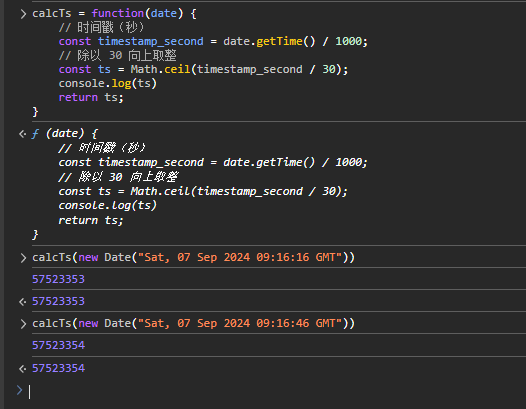日历计算器
- 创建一个日期类
- 对运算符进行重载
- 代码
创建一个日期类
年月日为类的成员变量,所以放到私有区域,又因为成员变量为内置类型,编译器自动生成的默认构造函数对其不做处理,所以需要我们显示定义一个构造函数,而析构函数、拷贝构造、赋值运算符重载函数,这三个函数编译器默认生成的已经够用了,所以不需要显示定义,(若对以上四种函数不了解的,可以看看博主的上一篇文章)
构造函数代码如下:
Date(int year = 2024, int month = 1, int day = 1)
{
_year = year;
_month = month;
_day = day;
}
为保证所创建出来的对象是已经被初始化的,在显式定义构造函数时,参数就用全缺省
日期的类的代码:
class Date
{
public:
Date(int year = 2024, int month = 1, int day = 1)
{
_year = year;
_month = month;
_day = day;
}
private:
int _year;
int _month;
int _day;
};
对运算符进行重载
对于日期来说,哪些运算符才是有意义的,有意义的我们才需要进行重载,如:日期±天数,是有意义的,两个日期的比较也是有意义的,日期-日期也是,而日期*日期显然是没意义的,所以,只需要实现比较运算符重载、±运算符重载、前置++,后置++运算符重载即可
- 实现比较运算符重载函数 :<、>、<=、>=、==、!=
- “<”运算符重载
实现该小于运算符重载,直接把全部小于的可能性全部找出来即可,先判断年,年小的日期就小,之后到月,再到日,代码如下:
bool operator<(const Date& d)
{
if (_year < d._year)
{
return true;
}
else if (_year == d._year
&& _month < d._month)
{
return true;
}
else if (_year == d._year
&& _month == d._month
&& _day < d._day)
{
return true;
}
else
{
return false;
}
}
- "=="运算符重载
年月日全部相等就说明两个日期相等,代码如下:
bool operator==(const Date& d)
{
return _year == d._year
&& _month == d._month
&& _day == d._day;
}
- “<=”运算符重载
前面实现了小于和等于的运算符重载,我们就可以复用它们的运算符重载来实现<=的运算符重载,代码如下:
// d1 < d2
// *this 就相当于d1,d就相当于d2
bool operator<=(const Date& d)
{
return *this < d || *this == d;
}
复用已经实现的运算符重载来实现另一个运算符重载,显然更加的简便
- “>”运算符重载
对小于等于取反即可,代码如下:
bool operator>(const Date& d)
{
return !(*this <= d);
}
- “>=”运算符重载
对小于取反即可,代码如下:
bool operator>=(const Date& d)
{
return !(*this < d);
}
6.“!=”运算符重载
对等于运算符取反即可,代码如下:
bool operator!=(const Date& d)
{
return !(*this == d);
}
总结小技巧:对于任何一个类,若实现比较运算符的重载,其实实现小于运算符重载和等于运算符重载,或者实现大于运算符重载和等于运算符重载即可,剩下的可以直接复用
- 实现±运算符重载函数
- “+=”运算符重载
实现日期+=天数,使用的是进位法。先将日期中的天数与所要加的天数相加,再判断相加之后的天数是否大于该日期的月份的天数,不大于就返回,若大于了则把加起来所得的天数减去该日期月份的天数,再将月份进一位,进位之后判断进位后的月份是否超过了12月,若超过则将月份调到1月,年份进一位,重复以上过程,直到相加之后的天数小于月份的天数即可,画图板如下:

在判断天数是否大于对应月份的天数之前,我们首先得完成对该月份的天数的获取,获取的时候还要注意判断该年是否为闰年,是闰年2月份为29天,平年的2月为28天,获取月份天数的代码如下:
int GetMonthDay(int year, int month)
{
assert(month > 0 && month < 13);
static int montharray[13] = { -1,31,28,31,30,31,30,31,31,30,31,30,31 };
// 该函数调用频繁,用static将数组放入静态区中,调用时就不需要频繁创建数组
if (month == 2 && ((year % 4 == 0 && year % 100 != 0) || (year % 400 == 0)))
{
//是闰年
return 29;
}
return montharray[month];
}
获取月份天数完成之后就可以根据上面的进位法实现+=运算符的重载,代码如下:
Date& operator+=(int day)
{
_day += day;
while (_day > GetMonthDay(_year, _month))
{
//先动天数
_day -= GetMonthDay(_year, _month);
++_month;
if (_month == 13)
{
_month = 1;
++_year;
}
}
return *this;
}
- “+”运算符重载
实现+运算符,我们可以直接复用+=运算符重载,但要注意返回值,+=返回的是加之后的日期本身,而+返回的不是日期本身,返回的是另一个对象,相当于返回的对象 = 日期 + 天数,加之后的日期是不变的,所以在这里,需要用到拷贝构造,将日期拷贝给要返回的对象,然后再在返回的对象上进行+=的复用,代码如下:
Date operator+(int day)
{
//拷贝构造,创建临时对象
Date tmp = *this;
tmp += day;
return tmp;
}
- “-=”运算符重载
实现日期-= 天数,用到借位法。日期上的天数减去要减掉的天数,减完之后判断,日期上的天数是否为负数,不是就直接返回;是负数就借上一个月的天数,将负的天数与借来的天数相加,月份得退一位,退一位之后判断月份是否小于1月,若小于则置为12月,年份退一位,如此重复以上过程,直到日期上的天数不为负数即可,画图板如下:

代码如下:
Date& operator-=(int day)
{
_day -= day;
while (_day <= 0)
{
//先动月份
--_month;
if (_month == 0)
{
_month = 12;
_year--;
}
_day += GetMonthDay(_year, _month);
}
return *this;
}
- “-”运算符重载
有了上述的经验,实现减号运算符重载,就直接复用-=运算符重载即可,代码如下:
Date operator-(int day)
{
Date tmp = *this;
tmp -= day;
return tmp;
}
- 前置“++”运算符重载
直接复用+=运算符即可,代码如下:
Date& operator++()
{
*this += 1;
return *this;
}
- 后置“++”运算符重载
后置++的运算符重载函数的参数需要增加一个int类型,与前置++构成区分,还有就是,后置++返回的是++之前的值,代码如下:
Date operator++(int)
{
Date tmp = *this;
*this += 1;
return tmp;
}
前置–和后置–的运算符重载与++类似,就不多说了,会在源码中写出来
- 日期-日期运算符重载
日期-日期,肯定有一个日期大,一个日期小,让小的日期一直++,直到小的日期与大的日期相等,中间加了多少次,就是相差的天数。用假设法判断日期的大小,先假设减号左边的日期大,右边的小,再进行判断是否如此
int operator-(const Date& d)
{
Date max = *this;
Date min = d;
int flag = 1;
if (*this < d)
{
max = d;
min = *this;
flag = -1; // 小的减大的值为负数,所以flag置为-1
}
int count = 0;
while (min != max)
{
min++;
count++;
}
return count * flag;
}
- 流插入“<<”运算符重载
该运算符应重载为全局函数,若重载成成员函数的话,第一个参数为隐含的this指针,第二个参数为cout,调用时为对象<<cout显然不具有惯性和可读性,所以重载为全局函数时,就可以置cout为第一个参数了,要输出的对象为第二个参数,调用时为cout<<对象,cout的类型为ostream。还要满足连续输出的情况,所以返回的是cout,输出时的顺序是从左往右输出,在输出就可连续输出,与赋值运算符重载的连续赋值类似,但方向不同。重载成全局函数时,又涉及到了访问私有变量的问题,可以使用友元关键字friend来解决这个问题,在类中的公共区域对该函数做友元函数声名即可,代码如下:
class Date
{
public:
friend ostream& operator<<(ostream& out, const Date& d);
private:
int _year;
int _month;
int _day;
};
ostream& operator<<(ostream& out, const Date& d)
{
out << d._year << "年" << d._month << "月" << d._day << "日" << endl;
return out;
}
- 流提取“>>”运算符重载
与流插入重载类似,只不过流提取的类型为istream类型,代码如下:
// 也需要友元函数声明
istream& operator>>(istream& in, Date& d)
{
in >> d._year >> d._month >> d._day;
return in;
}
代码
#include <iostream>
#include "Date.h"
#include <assert.h>
using std::cout;
using std::endl;
class Date
{
public:
friend ostream& operator<<(ostream& out, const Date& d);
friend istream& operator>>(istream& in, Date& d);
// 检查日期是否合法
bool CheckDate()
{
if (_month < 1 || _month > 12 || _day < 1 || _day > GetMonthDay(_year, _month))
{
return false;
}
else
{
return true;
}
}
Date(int year = 2024, int month = 1, int day = 1)
{
_year = year;
_month = month;
_day = day;
if (!CheckDate())
{
cout << "日期非法:";
cout << *this << endl;
}
}
void Print()
{
cout << _year << "/" << _month << "/" << _day << endl;
}
bool operator<(const Date& d)
{
if (_year < d._year)
{
return true;
}
else if (_year == d._year && _month < d._month)
{
return true;
}
else if (_year == d._year && _month == d._month && _day < d._day)
{
return true;
}
else
{
return false;
}
}
bool operator==(const Date& d)
{
return _year == d._year
&& _month == d._month
&& _day == d._day;
}
bool operator<=(const Date& d)
{
return *this < d || *this == d;
}
bool operator>(const Date& d)
{
return !(*this <= d);
}
bool operator>=(const Date& d)
{
return !(*this < d);
}
bool operator!=(const Date& d)
{
return !(*this == d);
}
int GetMonthDay(int year, int month)
{
assert(month > 0 && month < 13);
static int montharray[13] = { -1,31,28,31,30,31,30,31,31,30,31,30,31 };
// 该函数调用频繁,用static将数组放入静态区中,调用时就不需要频繁创建数组
if (month == 2 && ((year % 4 == 0 && year % 100 != 0) || (year % 400 == 0)))
{
//是闰年
return 29;
}
return montharray[month];
}
Date& operator+=(int day)
{
//防止+=的天数是个负数
if (day < 0)
{
*this -= -day;
return *this;
}
_day += day;
while (_day > GetMonthDay(_year, _month))
{
//先动天数
_day -= GetMonthDay(_year, _month);
++_month;
if (_month == 13)
{
_month = 1;
++_year;
}
}
return *this;
}
Date operator+(int day)
{
//拷贝构造,创建临时对象
Date tmp = *this;
tmp += day;
return tmp;
}
Date& operator-=(int day)
{
if (day < 0)
{
*this += -day;
return *this;
}
_day -= day;
while (_day <= 0)
{
--_month;
if (_month == 0)
{
_month = 12;
_year--;
}
_day += GetMonthDay(_year, _month);
}
return *this;
}
Date operator-(int day)
{
Date tmp = *this;
tmp -= day;
return tmp;
}
Date& operator++()
{
*this += 1;
return *this;
}
Date operator++(int)
{
Date tmp = *this;
*this += 1;
return tmp;
}
Date& operator--()
{
*this -= 1;
return *this;
}
Date operator--(int)
{
Date tmp = *this;
*this -= 1;
return tmp;
}
int operator-(const Date& d)
{
Date max = *this;
Date min = d;
int flag = 1;
if (*this < d)
{
max = d;
min = *this;
flag = -1;
}
int count = 0;
while (min != max)
{
min++;
count++;
}
return count * flag;
}
private:
int _year;
int _month;
int _day;
};
ostream& operator<<(ostream& out, const Date& d)
{
out << d._year << "年" << d._month << "月" << d._day << "日" << endl;
return out;
}
istream& operator>>(istream& in, Date& d)
{
while (1)
{
cout << "请依次输入年月日->";
in >> d._year >> d._month >> d._day;
if (d.CheckDate())
{
break;
}
else
{
cout << "日期非法,请重新输入!" << endl;
}
}
return in;
}



















